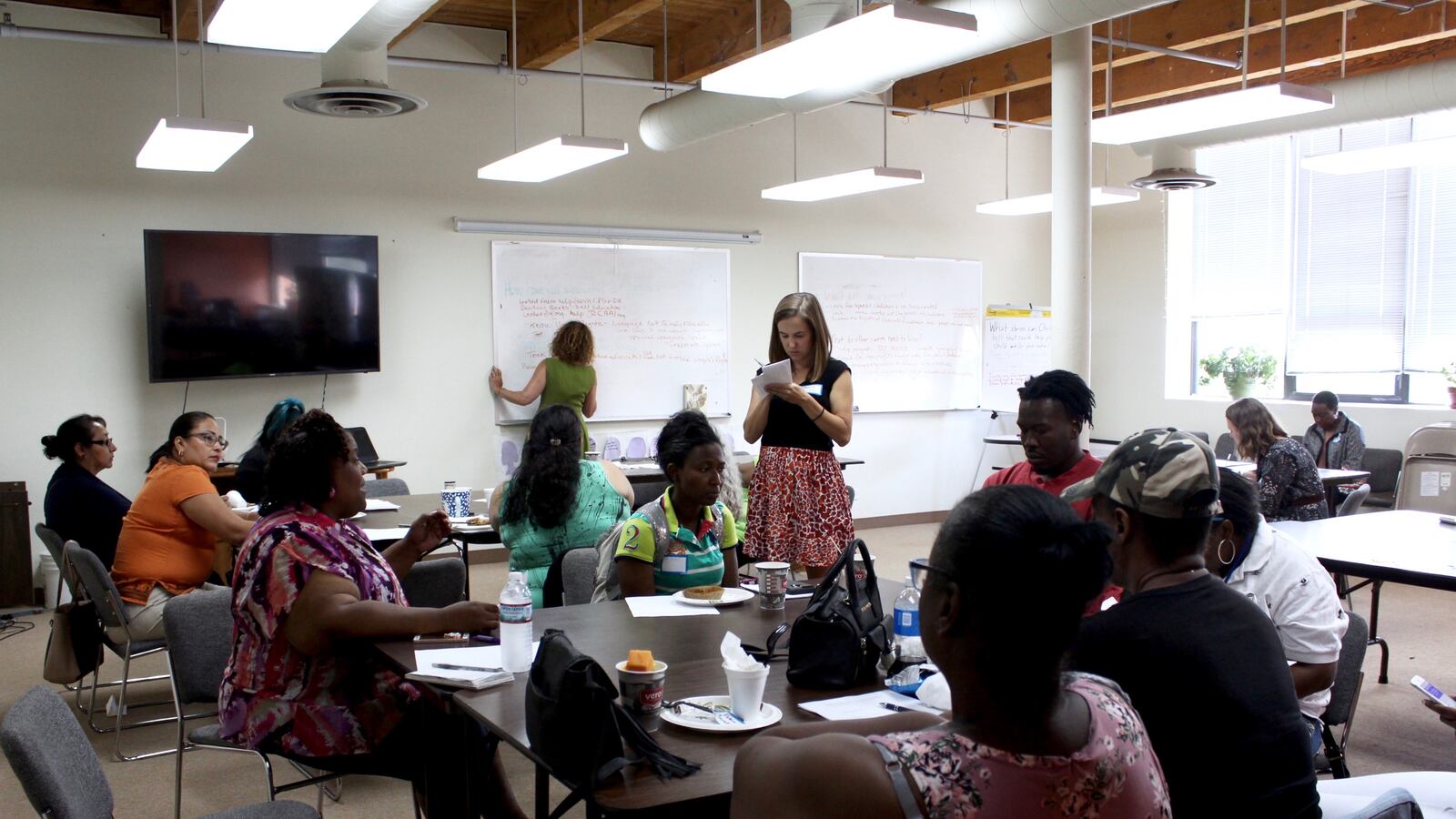The dozen or so mothers, grandmothers and aunts came from different neighborhoods of the city. But they shared something in common: a child they cared about had a disability and required a tailored schooling plan, and they wanted to learn how to be an advocate. This was the topic of a Chalkbeat Chicago listening tour event Monday at Community Organizing and Family Issues (COFI) on the Near West Side.
This was our fifth stop in a series of summer events in which we’re traveling to communities across the city and partnering with local groups to hear about their experiences in schools. Read about our first event here.
At COFI, we listened as parents counseled each other on how to help their children navigate a maze of specialists, doctors, acronyms, and public school choice. This maze has been especially difficult to navigate in recent years, as CPS cut special education funding and systematically delayed and denied special education services. One of the parents, Michelle Morton, said that her daughter had a speech impediment and was tested for speech services in pre-kindergarten. However, her daughter didn’t receive a specialized schooling plan, known as an Individualized Education Plan, or IEP, until Morton persisted with asking the principal. “Because I had already been working with COFI, I knew how to advocate,” she said. “But, not every parent knows how.”
Morton and other parents shared these pieces of advice with each other:
- Speak up and be persistent, even when the answer is “no.” Morton’s advocacy for her daughter didn’t stop after getting the IEP. After her daughter got older and began landing on the honor roll at Brunson Math & Science Specialty School in Austin, teachers told Morton she wouldn’t need an IEP anymore. Morton resisted, ultimately fighting to keep the IEP for her daughter.
- Document, document, document. Keep a big file of everything — from doctors’ reports to hard copies of evaluations — so that when you speak up, there’s evidence to back it up. Morton said that when she talked to her principal about keeping her daughter’s IEP, she provided copies of all her daughter’s speech tests and reports from doctors. “I came, papers in hand, ready for whatever the principal had to throw at me.”
- Ask for translation if you need it. That might be Spanish into English, or it might be figuring out how technical jargon translates into everyday language. Valerie Carroll spoke about advocating for her son, a high school freshman with special needs at Johnson College Prep in Englewood, and the power of a class she took through CPS’ Office of Diverse Learners to learn about terminology regarding special education.
- Don’t go to meetings alone. In meetings with administrators, take someone with you to help take notes and ask questions. The other person could help with translation, or can just help provide emotional support.
- Compare notes with other parents. Are they having similar experiences? Morton said that after talking with other parents whose children also have speech issues, they pieced together that their children weren’t receiving enough time in speech pathology as required by their IEPs. Another parent, Susana Salgado, said that talking to others has helped her “find the words” to help a family member who has been diagnosed with autism.
- Overcome the stigma of the label that comes with “diverse learning,” aka special education. Rosazlia Grillier, a parent peer trainer at COFI, said she has met parents who won’t acknowledge in a group setting that their children have special needs. Grillier said that acknowledging your child’s state of learning is the first step in getting the necessary resources for them.
- Volunteer — you learn much more about how your school works when you are regularly in it. Children really respond, too, when they see their family involved in education. Tara Williams, whose son attends Genevieve Melody STEM Elementary in East Garfield Park, said that with more family members and community advocates in schools, children can see that they have multiple people constantly support them. “They know if nobody else is going to fight for them,” she said, “then Mom, Daddy, auntie and uncle will.”
Chalkbeat will be holding two more listening tour events this summer. On August 14, we’re partnering with OneGoal and inviting teachers to join us to discuss experiences working in public education. Then on August 23, we’re joining City Bureau to host a public newsroom around the topic of education journalism and the power of the student voice — details coming soon.

